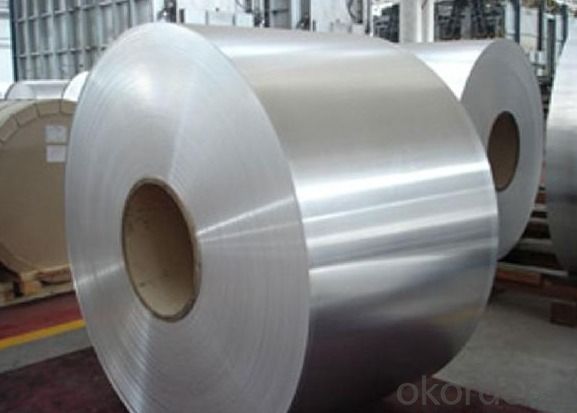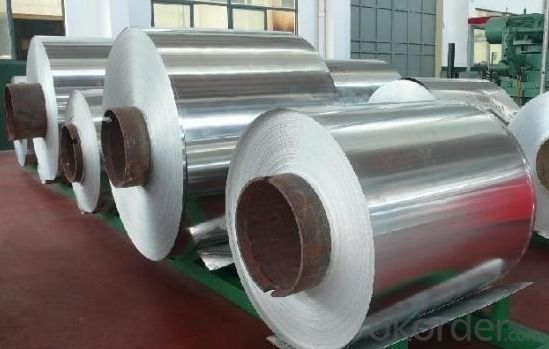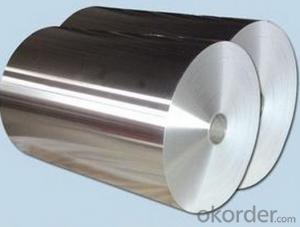Aluminium Coil 1100 h14 for composite panel
- Loading Port:
- Shanghai
- Payment Terms:
- TT OR LC
- Min Order Qty:
- 1 m.t.
- Supply Capability:
- 5000 m.t./month
OKorder Service Pledge
OKorder Financial Service
You Might Also Like
Item specifice
Product Description:
Alloy:1100
Temper: O H12 H14 H16 H18 H24
Thickness(mm):0.2-10mm
Width(mm):100-2500
Length(mm):800-13000
Delivery lead time: 20-25 days
Packing: wooden/veneer pallet, wooden/veneer case
Unit Price/Payment: FOB, CIF, CFR,CNF
Payment term: TT, LC at sight, Westen union
Country of origin: China
Certificate approved: ISO9001, SGS,ASTM, ENAW
MOQ: 2.0-2.5 metric ton per size
Advantages
1.Anticorrosion and antirust
2. High credit and quality :SGS,ISO9001:2008
3. Professional manufacture and control
4. Prompt delivery
1100 Chemistry Composition | |||||||||
Element | Si | Fe | Cu | Mn | Mg | Cr | Ti | Zn | Al |
Standard Value | 0.25 | 0.40 | 0.05 | 0.05 | 0.05 | --- | 0.03 | 0.05 | remain |


1100 Aluminum Coil
Low strength aluminum alloy has excellent corrosion resistance and satisfactory anodizing and conversion coating finishing characteristics. It is unmatched by any other commercial aluminum alloy in workability. Readily to welding, brazing, and soldering. Machinability is poor and tends to be "gummy". Non-heat treatable. Typical applications include chemical storage, processing equipment, kitchen utensils, and LED for channel letter ,general sheet metal work .
FAQ of Aluminium Coil 1100 h14 for composite panel:
1.Superior quality of raw material.
2.Reasonable and stable chemical composition.
3.Accurate tolerance.
4.Goode mechanical property.
5.We have the certificate of ISO9001.
- Q:What is the minimum order quantity for aluminum coils?
- The minimum order quantity for aluminum coils may differ based on the supplier and specific product requirements. Certain suppliers may set a minimum order quantity of one coil, whereas others may mandate several coils or even a full container load. To determine the minimum order quantity for aluminum coils, it is advisable to directly reach out to the supplier or manufacturer, as it can vary.
- Q:How are aluminum coils priced in the market?
- Aluminum coils are priced in the market based on several factors. The primary factor influencing the price of aluminum coils is the current market price of aluminum. Since aluminum is a commodity, its price is determined by global supply and demand dynamics, as well as factors like production costs and currency fluctuations. Additionally, the cost of processing and manufacturing aluminum coils also affects their pricing. This includes expenses such as refining, alloying, rolling, and any other specialized processes required to produce the coils. The cost of energy, labor, and raw materials used in the production process also contribute to the overall pricing. Furthermore, market competition and the overall demand for aluminum coils influence their pricing. If there is high demand for aluminum coils and limited supply, the prices are likely to be higher. Conversely, if there is low demand and excess supply, prices may be lower. The size, thickness, and quality of the aluminum coils also play a role in determining their price. Thicker, larger, and higher-quality coils generally command a higher price due to the increased material and processing costs involved. Finally, transportation costs, import/export duties, and taxes imposed by different countries can also impact the pricing of aluminum coils. These additional costs are often factored into the final price of the product. In summary, the pricing of aluminum coils in the market is influenced by the current market price of aluminum, production costs, market competition, demand and supply dynamics, size and quality of the coils, as well as additional costs associated with transportation and taxes.
- Q:Can aluminum coils be used in low-friction applications?
- Low-friction applications can indeed make use of aluminum coils. Aluminum, being a lightweight and corrosion-resistant material, exhibits excellent thermal conductivity. These characteristics render it suitable for a variety of applications that prioritize low-friction. The automotive, aerospace, and HVAC industries often employ aluminum coils in heat exchangers, evaporators, condensers, and cooling coils. These coils are specifically designed to efficiently transfer heat while minimizing friction and energy loss. Furthermore, aluminum coils find utility in electrical motors, generators, and transformers, where smooth operation and reduced energy consumption are vital. Additionally, the lightweight nature of aluminum contributes to overall system weight reduction, thereby increasing efficiency. Moreover, various types of machinery and equipment that necessitate low friction, such as conveyor systems, sliding mechanisms, and bearings, can benefit from the utilization of aluminum coils. Aluminum's low coefficient of friction enables smooth and efficient movement, minimizing wear and tear on components. In conclusion, aluminum coils offer versatility in low-friction applications due to their lightweight, corrosion-resistant, and thermally conductive properties. Incorporating these coils can result in improved energy efficiency, reduced maintenance costs, and enhanced performance across a wide range of industries.
- Q:Can aluminum coils be used in solar thermal systems?
- Certainly, solar thermal systems can utilize aluminum coils. Aluminum, renowned for its remarkable thermal conductivity, is widely employed in heat exchangers. Within a solar thermal system, aluminum coils can serve as a component of the heat exchanger, effectively transmitting the harnessed solar energy to the working fluid. By enabling efficient heat transfer, these aluminum coils guarantee the optimal utilization of the captured solar energy when heating water or other fluids. Moreover, aluminum's lightweight nature and resistance to corrosion render it an ideal material for outdoor applications like solar thermal systems.
- Q:Can aluminum coils be used for electrical enclosures?
- Electrical enclosures can indeed utilize aluminum coils. Aluminum, being a lightweight and durable substance, boasts exceptional electrical conductivity and heat dissipation capabilities. Furthermore, it exhibits commendable resistance to corrosion, rendering it appropriate for diverse environmental circumstances. Due to its malleability, aluminum coils effortlessly adopt various shapes and sizes, rendering them highly adaptable for enclosure designs. Moreover, aluminum represents a cost-effective alternative when compared to metals such as stainless steel. Nonetheless, it remains crucial to guarantee adequate insulation and grounding to avert any potential electrical hazards when employing aluminum coils in electrical enclosures.
- Q:Can aluminum coils be used in the production of aluminum composite ceilings?
- Yes, aluminum coils can be used in the production of aluminum composite ceilings. Aluminum coils are often used as the base material for manufacturing aluminum composite panels, which are then used to create ceilings. These coils are typically made of high-quality aluminum alloy and have undergone various processes to ensure their strength, durability, and aesthetic appearance. The aluminum coils are coated with a protective layer, such as PVDF or polyester, to enhance their resistance to weathering, UV rays, and corrosion. This coating also allows for a wide range of color options, providing flexibility in design choices for aluminum composite ceilings. Overall, aluminum coils are an essential component in the production of aluminum composite ceilings, offering a lightweight, fire-resistant, and long-lasting solution for various architectural and interior design applications.
- Q:Hello, I'd like to ask you a question. Can the aluminum coil be continuously pressed and cooled by kerosene?
- Yes, water and oil are not miscible. They must be emulsified
- Q:Can aluminum coils be used for seamless gutters?
- Seamless gutters can indeed utilize aluminum coils. The reason aluminum is favored for gutter systems is its ability to withstand wear, its lightweight composition, and its resistance to rust. Aluminum coils are frequently employed in the construction of seamless gutters, which boast several advantages over the more traditional sectional gutters. Custom-made on-site, seamless gutters guarantee a flawless fit for the specific measurements of a structure. This eliminates the necessity for seams, which are susceptible to leaks and require regular maintenance. Moreover, aluminum is malleable, making it easy to shape seamless gutters to accommodate a building's unique design. In summary, aluminum coils present a practical and efficient option for the creation of seamless gutters.
- Q:Can aluminum coils be used in the production of architectural façades?
- Aluminum coils are indeed suitable for the production of architectural façades. Façades made of aluminum are highly favored due to their durability, lightweight characteristics, and aesthetic attractiveness. By incorporating aluminum coils into façade manufacturing, customization becomes effortless, as they can be readily molded and fashioned into different designs and profiles. Moreover, aluminum exhibits resistance against corrosion, rendering it suitable for outdoor use. Furthermore, it possesses exceptional thermal and acoustic insulation properties, thereby enhancing energy efficiency and soundproofing. In conclusion, aluminum coils offer a versatile and efficient choice for the creation of architectural façades.
- Q:I have a diamond back bike with an aluminum frame. will it rust if i ride or put it in the frame? is it bad for the bike?
- sophisticated task. search onto a search engine. this can help!
1. Manufacturer Overview |
|
|---|---|
| Location | |
| Year Established | |
| Annual Output Value | |
| Main Markets | |
| Company Certifications | |
2. Manufacturer Certificates |
|
|---|---|
| a) Certification Name | |
| Range | |
| Reference | |
| Validity Period | |
3. Manufacturer Capability |
|
|---|---|
| a)Trade Capacity | |
| Nearest Port | |
| Export Percentage | |
| No.of Employees in Trade Department | |
| Language Spoken: | |
| b)Factory Information | |
| Factory Size: | |
| No. of Production Lines | |
| Contract Manufacturing | |
| Product Price Range | |
Send your message to us
Aluminium Coil 1100 h14 for composite panel
- Loading Port:
- Shanghai
- Payment Terms:
- TT OR LC
- Min Order Qty:
- 1 m.t.
- Supply Capability:
- 5000 m.t./month
OKorder Service Pledge
OKorder Financial Service
Similar products
New products
Hot products
Related keywords






























